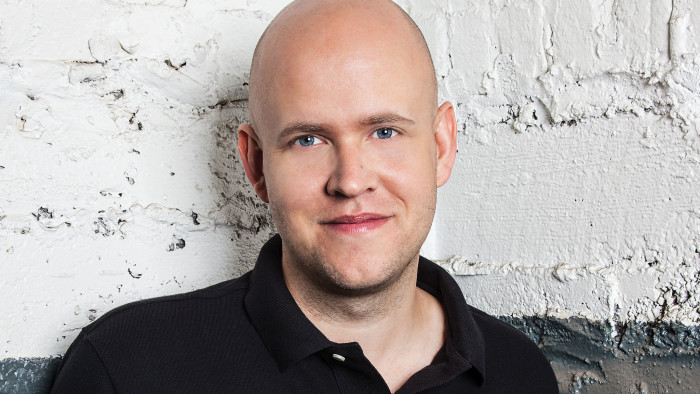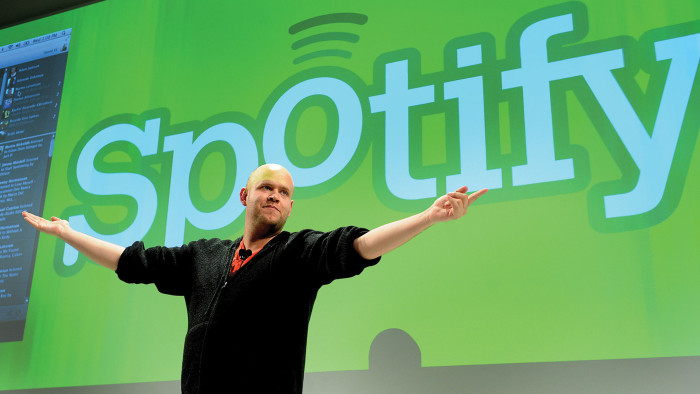Euro tech special: The music man

Simply sign up to the Life & Arts myFT Digest -- delivered directly to your inbox.
Daniel Ek is reflecting on how he has changed over the past decade. “I used to have hair and now I have none,” he says. The Swede, 32, blames premature baldness on the stresses of running Spotify, the start-up he has built from an idea cooked up in a forest cabin into the world’s leading music-streaming service.
Today, 60 million people listen to songs “streamed” over the internet through Spotify. To build the business, Ek has negotiated with intransigent record labels and raised hundreds of millions of dollars from once-sceptical investors. Though adored by users, its effect on the music industry has been attacked by some. In the past, Ek said he was hurt when, in 2013, Radiohead’s Thom Yorke described Spotify as “the last desperate fart of a dying corpse”.
“It’s been a very challenging process,” he says.
Yet Ek insists he has never been happier. To understand why, you need to picture him 10 years ago, when he was living the life that many young men fantasise about. At the time, he still had his hair and was a millionaire. It had been a rapid rise for a quiet child, brought up by a father who was a car mechanic turned IT engineer and a mother, the daughter of an opera singer, who bought him his first guitar when he was four. Soon after that, he got his first computer and became a self-taught programmer.
European Tech Entrepreneurs

Europe’s Top 50
Our panel picks Europe’s best talent
Watch out Silicon Valley
Skype’s Niklas Zennström on why Europeans have an edge
Top 10 under 30
The young tech entrepreneurs changing the way we work, play and buy
Hubs of activity Europe’s cities are proving ideal places for on-demand and travel-related start-ups
Europe à la mode
The continent is at the heart of fashion technology innovation
How did we pick them?
Judges considered factors such as innovation, impact and global standing
VIDEO: Founders Forum tech roundup
From flying cars to eye-tracking devices, what people got excited about at this year’s Founders Forum
PODCAST: Tech bubbles then and now
Brent Hoberman, creator of Founders Forum and co-founder of Lastminute.com, talks to Caroline Daniel, editor of FT Weekend
Ek applied to Google as a teenager but was turned down because he didn’t have a degree. He had, however, been creating internet businesses since he was 14, selling several to make an early fortune. So, at 22, Ek rented a big apartment in Stockholm, owned a red Ferrari Modena and could gain easy entry into any nightclub in the city. “I’m embarrassed to admit it,” he says. “You get into the cooler parties. You get the girls. You have the car you want. For a while, I thought it was important to me and tried to do all of that. But I realised that I was miserable.”
Depressed, in 2006, he relocated to a cabin near his parents’ home. He meditated. Sometimes, he was joined by a friend, also in an existential funk: Martin Lorentzen, the founder of Tradedoubler, a Swedish internet marketing firm. “He was coming through a very similar journey,” says Ek.
The pair, both music lovers, began to spitball ideas. Ek recalls: “We started talking about Napster [the popular file-sharing service shut down over piracy concerns] and the evolution of music and how, despite Napster being an amazing product, it didn’t work out with the music industry. Then it dawned upon us that the answer was clear and right in front of us.” Together, they dreamt up a service which could act as a universal jukebox — allowing anyone, anywhere, to listen to any track they wanted through the internet.
Sweden is possibly the only place in the world that could have nurtured and sustained the concept. In 2006, record labels were losing billions globally thanks to internet piracy. Nowhere was it worse than in the Scandinavian nation. “We’re talking about a [Swedish music] market that back then had lost 90 per cent of all of its revenue,” Ek says. “A total collapse.”
When approached in 2008, American labels laughed at the idea of handing over their precious catalogues to an unknown European start-up. But in Sweden, music companies were cornered and willing to experiment. They agreed to do the deals required to launch Spotify.
Their compatriots loved it. In Sweden, at least, it saved the industry from the ravages of pirates: today it accounts for 70 per cent of their revenues. Its success within this national Petri dish was critical in convincing record companies elsewhere to craft their own deals with the company.
Yet it took years to gain licences to launch in the US, the world’s biggest music market, in July 2011. Ek and Lorentzon pumped their personal fortunes into the business to prevent it going under. The company has since raised more than $500m from some of the world’s top technology investors. Ek’s Swedishness — calmness and a sense of community — may have helped in the dicier times.
“What I’ve found is that the company you build takes on a lot of traits that you have yourself,” he says in a quiet drawl that hovers, like his life, between Scandinavia and America. “I was talking to Travis Kalanick [founder] of Uber, [the taxi app] group. Travis is one of those guys that, if you’re getting into a street fight, you probably want to have him next to you. He’s pretty aggressive and doesn’t back down. I think that’s part of the reason why Uber’s been so successful.
“Similarly, what we’ve seen in the music industry, it took someone to say, ‘Hey guys, there’s nothing to worry about. The world will look better a year from now. Let’s just keep on doing great music. Let’s keep working together and we’ll ride it through. Let’s be partners in all of this.’”
Such kumbaya tactics may work in some negotiations but doubts remain about the viability of the business. Financial statements released last month show that Spotify’s revenues rose 44 per cent to just over €1bn in 2014. But its losses also grew to €165m as it made big investments in technology, marketing and expansion, while paying the bulk of its revenues to rights holders. Spotify continues to grow its offerings, introducing videos and podcasts in May.
As the streaming service has to renegotiate deals with record labels every few years, the fear is that they will keep pushing for better terms and eat further into revenues. Unlike other tech businesses, Spotify’s growth doesn’t necessarily mean more cash flowing into its coffers.
Ek, inevitably, provides a more optimistic spin. “What we’re really doing is putting the pedal to the floor, stepping on it and trying to grow as fast as we can,” he says. “The quicker we can grow, the quicker the industry can return to growth, the more money that will flow through to artists and the more money that will flow back to Spotify. It’s really that simple. We’re taking the losses because there’s a tremendous amount of growth still to happen.”
Others claim Spotify provides a bad deal for artists. Many musicians say they are delighted with the cheques they receive. But some, such as singer-songwriter Taylor Swift, who removed her back catalogue from Spotify last year, blame streaming services for helping to destroy lucrative album sales. “The value of an album is, and will continue to be, based on the amount of heart and soul an artist has bled into a body of work,” wrote Swift in The Wall Street Journal.

Ek says the complaints are symptomatic of a systemic problem, where money doesn’t trickle back to artists quickly enough. Often, royalty payments take years to be paid out. “The biggest artists on Spotify are making between $5m and $10m a year,” he says. “That’s not pocket change . . . The pool of money that even a medium-sized artist makes will just increase as more and more people move over to streaming.”
Spotify’s impact has left Ek a rock star in the tech world and at the forefront of global debate about the music industry’s future. Yet, he remains close to his native Stockholm, where Spotify has built a massive five-storey headquarters. Local entrepreneurs speak fondly of Ek, saying he has tried to nurture the booming tech start-up scene.
Alan Mamedi, chief executive of Truecaller, a universal phonebook app based in the city, recalls that before closing a big funding round he sent Ek a “random email” soliciting advice. The result was a long lunch at which Truecaller’s founders asked about scaling a company: “Those three hours were super valuable to us,” says Mamedi.
Ek’s desire to stay independent and build from Europe is remarkable. In the past, American suitors have quickly snapped up the continent’s best tech groups before they could become international giants. Over the years, Ek admits he has had plenty of offers to sell. But he says the urge to cash out diminishes if you have already experienced a rich but vacuous existence.
“I’m having a blast,” he says. “I’m enjoying every day that I go to work. I get to learn from super-smart people inside my company. Plus I get to meet some of the world’s coolest people . . . What’s not to like about that lifestyle?”
Murad Ahmed is the FT’s European technology correspondent
Comments